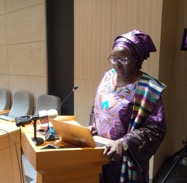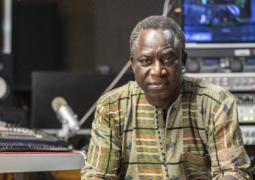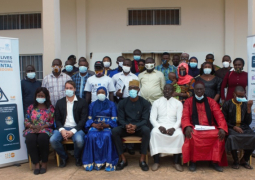
Speaking at a dialogue on: ‘Building Strong Rule of Law Institutions in The Gambia’ on Friday at SDKJ International Conference Center in Bijilo, Madam Sallah-Njie, also the former commissioner of the CRC, said: “A new constitution is needed to establish The Gambia a truly constitutional democracy guided by rule of law, principle and values of governance, and guaranteed fundamental human rights and freedom.”
The National Assembly of The Gambia in 2017 enacted the Constitutional Review Commission (CRC) Act aimed at establishing a CRC that would guide the country to review the 1997 Constitution and get a new constitution. The CRC was established and 11 commissioners appointed including Mrs. Sallah-Njie.
The proposed new constitution was meant to replace the 1997 Constitution to ensure respect for rule of law and fundamental human rights; ensure democratic participation in national affairs; provide a solid foundation for good governance and establish good governance structures.
However, in 2020, the CRC developed a Draft Constitution. It was sent to the National Assembly on 14 September 2020 for approval but could not make it to the referendum stage due to its failure to pass the 2/3 votes needed in the National Assembly.
Madam Sallah-Njie justified that the draft of a new constitution to replace the current one was centered on the transitional process of the country to enhance democratic process.
“When we were doing the review we were told the constitution was amended by former dictator Yahya Jammeh over 50 times,” she said.
The former CRC commissioner said the 2020 Draft Constitution introduced several measures aimed at enhancing and strengthening democracy and good governance such as the presidential term limits – which she said was prescribed by the act of parliament that established the CRC.
The constitutional drafter further said the 2020 Draft Constitution limits the executive power as well as has provisions that ensure political inclusion for marginalised groups including women, persons with disability and youth.
“I must say, the public has very high hopes and expectations of the constitutional review process. From 2020 to date there has been ongoing dialogues to resuscitate the 2020 Draft Constitution that failed to garner the 2/3 majority in order to pass the second stage at the National Assembly,” she stated.
She added: “There have been proposals even to amend the 1997 Constitution instead of presenting a new draft. However, I have the firm belief that The Gambia needs a new constitution and not just to amend the existing one. Re-introducing the 2020 Draft Constitution in the National Assembly will be more ideal than making an amendment to the current one.”
Madam Sallah-Njie argued that some provisions of the 1997 Constitution are rhetorical; therefore, contain no legal rights while others offered too much powers to the President.
She believed that the 2020 Draft Constitution was rejected based on lack of political consensus.
Njundu Drammeh, another commissioner at the National Human Rights Commission, who was a panelist at the forum, said there’s a greater need for the revival of the 2020 Draft Constitution.
However, Commissioner Drammeh argued that there is no guarantee that history will not repeat itself. Therefore, he emphasised the need for a democratic constitution in the country.
Salieu Taal, the president of The Gambia Bar Association, also a panelist, said the 2020 Draft Constitution was rejected at the National Assembly based on political grounds. He reasoned that the comatose Draft Constitution should be resuscitated.



